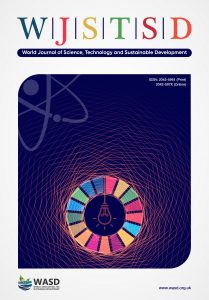Sustainable soil management practices A key to combat soil desertification in the hills of Nepal, Dr. Shiva Shrestha
 Dr. Shiva Kumar Shrestha
Dr. Shiva Kumar Shrestha
Sustainable Soil Management Programme, Lalitpur
Nepa
Email: shiva_gorkha13@yahoo.com
DOI: 10.1108/WJSTSD-07-2014-0015
Purpose: Temporary and permanent decline in the productive capacity of the land due to natural and human-induced activities such as soil erosion, changing cropping practices and less use of organic matter (OM) has been the greatest challenge faced by mankind in recent years, particularly in the hills and mountains of Nepal. Hence, the purpose of this paper is to examine the effectiveness of sustainable soil management practices to mitigate desertification process in the hills of Nepal.
Design/methodology/approach: Promotion of sustainable soil management (SSM) practices through a decentralised agriculture extension approach by involving all the stakeholders in a participatory way.
Findings: SSM practices mainly: OM management, fodder and forage promotion, increased biomass production systems, integrated plant nutrition systems, and bioengineering for soil and water conservation are identified as the most appropriate and relevant technologies in mitigating the desertification process without deteriorating land quality, particularly conserving the top-soils effectively and efficiently in the hills and mountains of the country.
Research limitations/implications: This research is focus on the overall effect of SSM practices due to time and budget constraints. There is scope for doing research on the different aspects of SSM practices and the extent of their effect on different soil parameters (chemical, biological and physical).
Practical implications: SSM interventions clearly indicated that there is significant impact in increasing soil fertility, conserving fertile top-soils and mitigating physical, chemical and biologic desertification processes. These are possible through maintaining and improving the soil organic matter, which is the most important indicator for soil health. SSM practices have resulted in an increase of up to 30 per cent in crop yield compared to yields without SSM practices. This might be due to the improvement in SOC which improves soil texture, increases nutrient supply from organic source and conserves water quality, thus, improving soil quality.
Social implications: This has created awareness among farmers. Hence, farmers are mitigating pH through increased use of organic manures, where there is less availability of agriculture lime and they are far from road access.
Originality/value: SSM practices significantly contributes to combat soil desertification in the hills of Nepal.
Keywords: Sustainable development; Desertification; Best practice in promotion of technologies; Soil erosion; Top-soils; Sustainable soil management practices.
Citation: Shrestha, S.K. (2015), "Sustainable soil management practices: A key to combat soil desertification in the hills of Nepal ", World Journal of Science, Technology and Sustainable Development, Vol. 12 No. 1, pp. 13-24. https://doi.org/10.1108/WJSTSD-07-2014-0015

